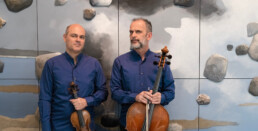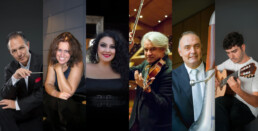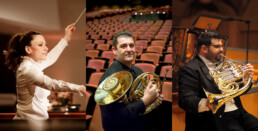More than half a quartet
Despite the wide range of the two instruments' mastery and timber, composers had not found a way to express the combination of violin and cello, until the beginning of the 20th century. Few composers had managed to treat the two instruments as equal collaborators and their great peers of the beginning of the 20th century had to broaden their musical dialect, looking for a common ground for the two instruments to harmonically join their pace in large-scale works. Further than their indisputable artistic value, the programme's three works vividly project the rapid developments in the European musical field during the turbulent first quarter of the 20th century.
Corinth's concerto
This year's artistic season concludes with another concert tour outside Athens. Leo Brouwer's Corinth Concerto for guitar, commissioned by the Greek Orchestra of Athens and the Municipality of Corinth, is a wonderful musical "prelude" before the performance of the famous Ninth Symphony by the Czech Romantic Antonín Dvořák, conducted by Nikos Haliasas. This famous symphony was written at the end of the 19th century during the composer's stay in New York, drawing on his musical experiences in the United States and incorporating them into an emotionally charged and orchestrationally brilliant symphonic masterpiece.
Modern antiquity
Ideas, persons, myths and incidents of the classical antiquity have never stopped, until today, to stimulate the artists' thought and fantasy. The distinct conductor (and one of the principal violins of the Athens State Orchestra), Nikos Haliassas, recompiles and re-creates works of distinct- and less known- Greek composers of the past and the present, on a common ground inspired by the ancient world. However, the programme's jewel is the "Corinth Concerto" for guitar of the legendary Cuban guitarist and composer, Leo Brouwer, performed by the distinct soloist, Dimitris Soukaras.
Fazil Say: Mother Earth
Born in Shanghai, raised and studied music in New Zealand, she completed her studies in Wales and lives in Europe: Tianyi Lu, winner of the precious 1st prize in the international conductors' contest Sir Georg Solti (2020) is one of these women who scatter any possible reserve as for a woman's capacity in a traditionally male role. In her debut with the Athens State Orchestra, she undertakes the honoring responsibility to present "Mother Earth", the new Concerto for piano of the major Turkish composer and pianist Fazil Say, who shall perform the soloist part. Say is an amazing phenomenon of our era, as he writes and plays music "from the bottom of his heart", mixing in an inconceivably natural way the musical tradition of the East with the classical forms, jazz and improvisation! One thing is for sure: whether one agrees or not with his musical proposals, it is worth to acquaint with them- or, better said, to experience them...
Gidon Kremer in Athens
The Russian conductor, Daniel Raiskin is famous for his original programmes and rich, dynamic interpretations of a very broad repertoire; those features, among others, have rendered him very popular between orchestras and audiences at an international level. Of course, it is with great interest that we expect the collaboration of the world famous Lithuanian violinist, Gidon Kremer and his compatriot cellist, Giedrė Dirvanauskaitė, founding member of the Kremerata Baltica and frequent collaborator of Kremer's in chamber music concerts. The performance of Variation 21 by Konstantina Gourzi, a precious composer and tiredless conductor with a huge work and recognition within the European musical world cannot be overlooked.
Jupiter Symphony
Loyal to its established aim, to represent literary symphonic music all over the Greek territory, the Athens State Orchestra, under the baton of the conductor Katia Molfesi, visits the always hospitable Municipal Theatre of Piraeus and then the cities of Lamia and Larissa, presenting Mozart's supreme symphonic masterpiece, his last Symphony, named "Jupiter" due to its glory and splendor. The lovers of romanticist sentimentality shall have the opportunity to enjoy Tchaikovsky's lyrical serenade, while all of them shall acquaint with the work of one among the most renown and active composers of our country, Spiros Mazis, as approached by the two top hornists of our Orchestra.
Jupiter Symphony
Loyal to its established aim, to represent literary symphonic music all over the Greek territory, the Athens State Orchestra, under the baton of the conductor Katia Molfesi, visits the always hospitable Municipal Theatre of Piraeus and then the cities of Lamia and Larissa, presenting Mozart's supreme symphonic masterpiece, his last Symphony, named "Jupiter" due to its glory and splendor. The lovers of romanticist sentimentality shall have the opportunity to enjoy Tchaikovsky's lyrical serenade, while all of them shall acquaint with the work of one among the most renown and active composers of our country, Spiros Mazis, as approached by the two top hornists of our Orchestra.
Jupiter Symphony
Loyal to its established aim, to represent literary symphonic music all over the Greek territory, the Athens State Orchestra, under the baton of the conductor Katia Molfesi, visits the always hospitable Municipal Theatre of Piraeus and then the cities of Lamia and Larissa, presenting Mozart's supreme symphonic masterpiece, his last Symphony, named "Jupiter" due to its glory and splendor. The lovers of romanticist sentimentality shall have the opportunity to enjoy Tchaikovsky's lyrical serenade, while all of them shall acquaint with the work of one among the most renown and active composers of our country, Spiros Mazis, as approached by the two top hornists of our Orchestra.
Journey to the Center of Music – Opera
A series of interactive concerts aiming to shed light to all that connect the modern audience with the timeless symphonic music, bringing the latter closer to those who are not acquainted therewith, as well as to its most fanatic audience. Videos, Speeches and Music interact by dramatizing each time the portrait of a different symphonic musical genre. Known and unknown historical information, personal stories, concealed symbolism and patterns and the magic of the works' structure, presented in a delightful way.
Journey to the Center of Music – Opera
A series of interactive concerts aiming to shed light to all that connect the modern audience with the timeless symphonic music, bringing the latter closer to those who are not acquainted therewith, as well as to its most fanatic audience. Videos, Speeches and Music interact by dramatizing each time the portrait of a different symphonic musical genre. Known and unknown historical information, personal stories, concealed symbolism and patterns and the magic of the works' structure, presented in a delightful way.





